
Air France-KLM Warns of Strategy Review on Schiphol Capacity Cut
Air France-KLM said it may be forced to adjust operations after the Dutch government won permission to curtail
2023-07-07 21:52
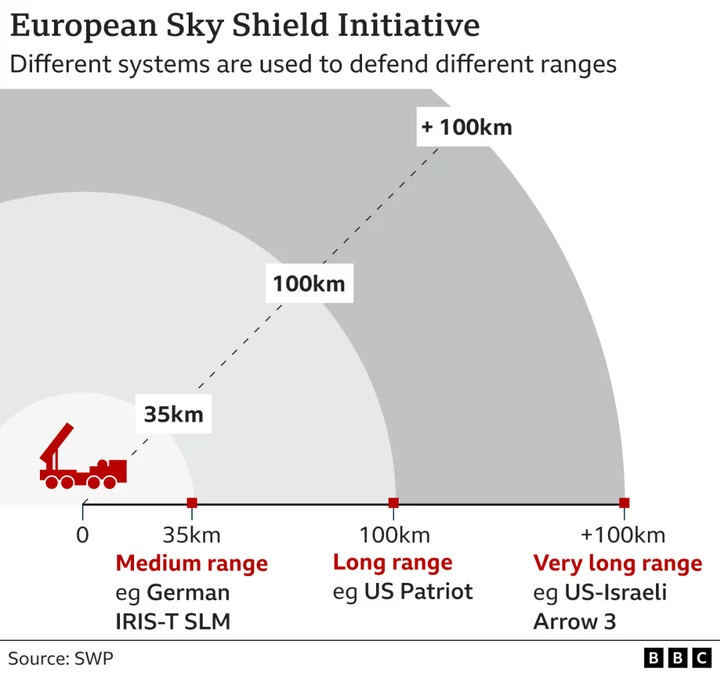
Neutral Swiss and Austrians join Europe's Sky Shield defence
The plan to protect European skies has now attracted 19 countries since Russia invaded Ukraine.
2023-07-07 20:23
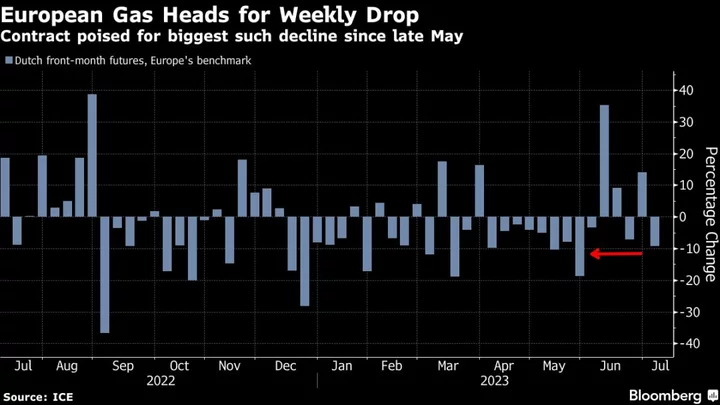
Europe Gas Set for Biggest Weekly Drop Since May as Stocks Rise
European natural gas futures are set for their biggest weekly loss since late May as rising inventories and
2023-07-07 19:48

Irish Rail warns of fake ticket inspectors
Members of the public are reported as wearing unofficial, hi-vis vests onboard trains in Dublin.
2023-07-07 19:25
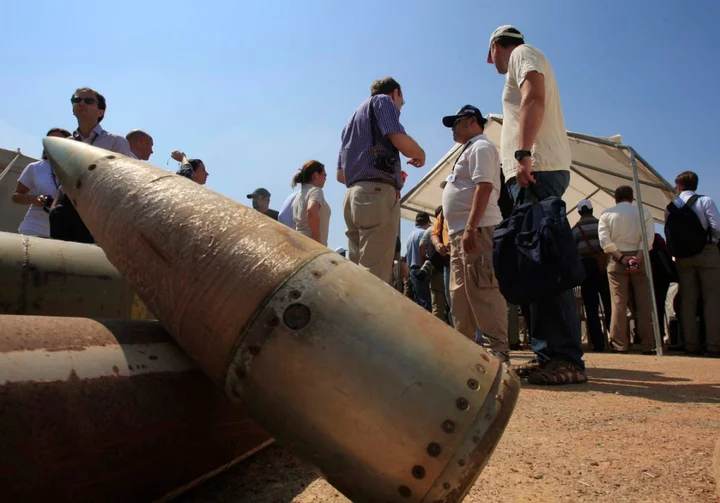
What are cluster bombs and why is it controversial for the US to send them to Ukraine?
The United States is expected to announce it is sending cluster munitions to Ukraine to help its military push back Russian forces entrenched along the front lines. The administration of Joe Biden is set to say that it will send thousands of them as part of a new military aid package worth $800m (£630m). The move will likely trigger outrage from some allies and humanitarian groups that have long opposed the use of cluster bombs. Proponents argue that both Russia and Ukraine have already been using the controversial weapon in Ukraine and that the munitions the US will provide have a reduced dud rate, meaning there will be far fewer unexploded rounds that can result in unintended civilian deaths. Here is a look at what cluster munitions are, where they have been used and why the U.S. plans to provide them to Ukraine now. What is a cluster munition? A cluster munition is a bomb that opens in the air and releases smaller "bomblets" across a wide area. The bomblets are designed to take out tanks and equipment, as well as troops, hitting multiple targets at the same time. The munitions are launched by the same artillery weapons that Western allies have already provided to Ukraine for the war — such as howitzers — and the type of cluster munition that the US is planning to send is based on a common 155 mm shell that is already widely in use across the battlefield. Why are they so controversial? In previous conflicts, cluster munitions have had a high dud rate, which meant that thousands of the smaller unexploded bomblets remained behind and killed and maimed people decades later. The US last used its cluster munitions in battle in Iraq in 2003, and decided not to continue using them as the conflict shifted to more urban environments with more dense civilian populations. On Thursday, Brigadier General Pat Ryder – the Pentagon press secretary – said the US Defense Department has "multiple variants" of the munitions and "the ones that we are considering providing would not include older variants with [unexploding] rates that are higher than 2.35 per cent." A convention banning the use of cluster bombs has been joined by more than 120 countries, which agreed not to use, produce, transfer or stockpile the weapons and to clear them after they've been used. The US, Russia and Ukraine haven't signed on. Why provide them now? For more than a year the US has dipped into its own stocks of traditional 155 howitzer munitions and sent more than two million rounds to Ukraine. Allies across the globe, including the UK, have provided hundreds of thousands more. A 155 mm round can strike targets 15 to 20 miles (24 to 32 kilometres) away, making them a munition of choice for Ukrainian ground troops trying to hit enemy targets from a distance. Ukrainian forces are burning through thousands of the rounds a day battling the Russians. Yehor Cherniev, a member of Ukraine's parliament, told reporters at a German Marshall Fund event in the US this spring that Kyiv would likely need to fire 7,000 to 9,000 of the rounds daily in intensified counteroffensive fighting. Providing that many puts substantial pressure on U.S. and allied stocks. The cluster bomb can destroy more targets with fewer rounds, and since the US hasn't used them in conflict since Iraq, it has large amounts of them in storage it can access quickly, said Ryan Brobst, a research analyst for the Foundation for Defense of Democracies. A March 2023 letter from top House and Senate Republicans to the Biden administration said the US may have as many as three million cluster munitions available for use, and urged the White House to send the munitions to alleviate pressure on American war supplies. "Cluster munitions are more effective than unitary artillery shells because they inflict damage over a wider area," Mr Brobst said. "This is important for Ukraine as they try to clear heavily fortified Russian positions." Tapping into the US stores of cluster munitions could address Ukraine's shell shortage and alleviate pressure on the 155 mm stockpiles in the US and elsewhere, Mr Brobst said. Is using cluster bombs a war crime? Use of cluster bombs itself does not violate international law, but using them against civilians can be a violation. As in any strike, determining a war crime requires looking at whether the target was legitimate and if precautions were taken to avoid civilian casualties. "The part of international law where this starts playing [a role], though, is indiscriminate attacks targeting civilians," Human Rights Watch's associate arms director Mark Hiznay said. "So that's not necessarily related to the weapons, but the way the weapons are used." Where have cluster bombs been used? The bombs have been deployed in many recent conflicts. The US initially considered cluster bombs an integral part of its arsenal during the invasion of Afghanistan that began in 2001, according to Human Rights Watch (HRW). The group estimated that the US-led coalition dropped more than 1,500 cluster bombs in Afghanistan during the first three years of the conflict. The Defense Department had been due to stop use of any cluster munitions with a rate of unexploded ordnance greater than 1 per cent, by 2019. But the Trump administration rolled back that policy, allowing commanders to approve use of such munitions. Syrian government troops have often used cluster munitions — supplied by Russia — against opposition strongholds during that country's civil war, frequently hitting civilian targets and infrastructure. And Israel used them in civilian areas in south Lebanon, including during the 1982 invasion. During the month-long 2006 war with Hezbollah, HRW and the United Nations accused Israel of firing as many as four million cluster munitions into Lebanon. That left unexploded ordnance that threatens Lebanese civilians to this day. The Saudi-led coalition in Yemen has been criticized for its use of cluster bombs in the war with the Iran-backed Houthi rebels that has ravaged the southern Arabian country. In 2017, Yemen was the second deadliest country for cluster munitions after Syria, according to the UN. Children have been killed or maimed long after the munitions originally fell, making it difficult to know the true toll. In the 1980s, the Russians made heavy use of cluster bombs during their 10-year invasion of Afghanistan. As a result of decades of war, the Afghan countryside remains one of the most heavily mined countries in the world. Associated Press Read More The Body in the Woods | An Independent TV Original Documentary The harrowing discovery at centre of The Independent’s new documentary Biden is considering sending controversial cluster munitions to help Ukraine Muslims across Pakistan hold anti-Sweden rallies to denounce burning of Islam's holy book Ukraine claims new gains made against Russia’s troops near Bakhmut - live
2023-07-07 19:21
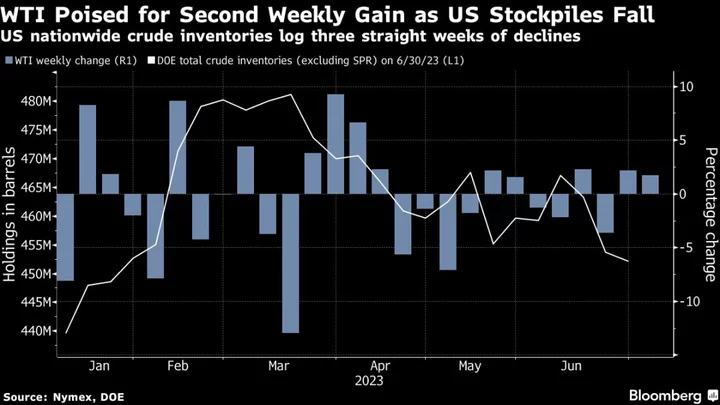
Ukraine Recap: Zelenskiy to Discuss Grain Deal With Erdogan
Ukraine President Volodymyr Zelenskiy is expected to meet President Recep Tayyip Erdogan in Istanbul late on Friday as
2023-07-07 19:15

Chinese Foreign Minister’s Unusual 12-Day Absence Draws Scrutiny
Chinese Foreign Minister Qin Gang has been absent from public view for 12 days, an usual absence for
2023-07-07 18:56

String of Global Heat Records Raises Alarm on Climate Change
Global temperatures have hit records for three days this week, raising concerns over the impact of extreme heat
2023-07-07 16:50

Germany, Spain Brace for Scorching Heat in Coming Days
The sweltering heat forecast for Germany this weekend is set to intensify, while peak temperatures in the Spanish
2023-07-07 16:22

German Production Drops as Factory Weakness Weighs on Growth
German industrial production unexpectedly fell in May, casting a shadow over the recovery in Europe’s largest economy from
2023-07-07 14:53
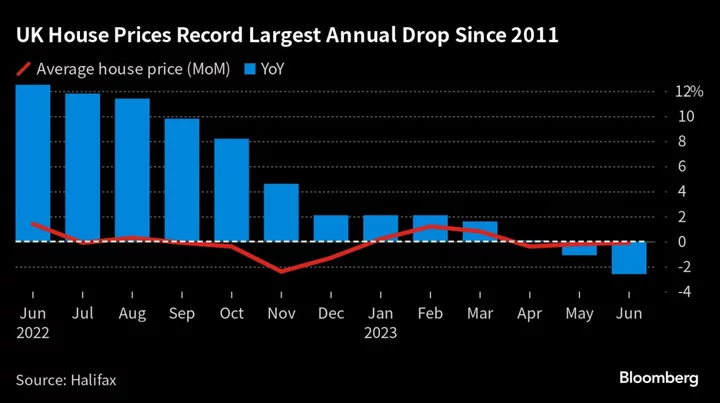
UK House Prices Fall Most in More Than a Decade, Halifax Says
UK house prices are falling at their fastest annual pace since 2011, Halifax said, as the property market
2023-07-07 14:48
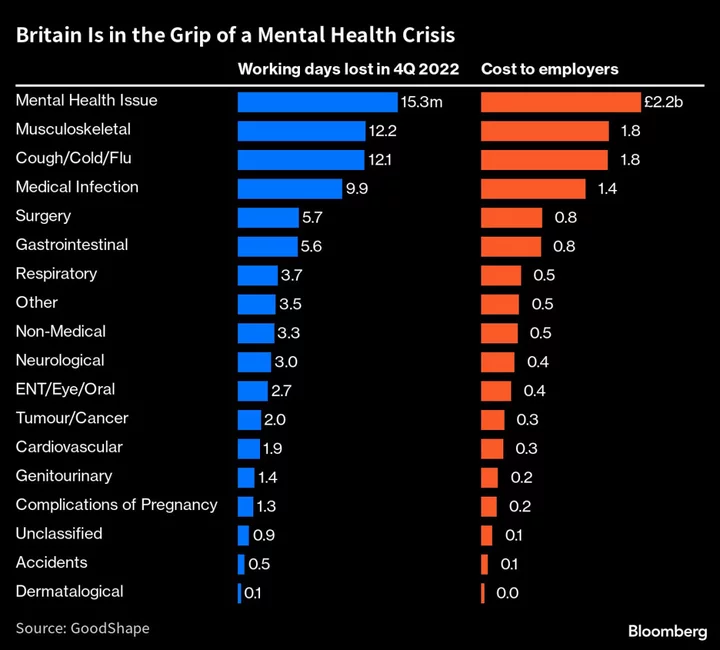
Sunak Seeks to Cut Number of Britons ‘Unfit to Work’
Prime Minister Rishi Sunak is looking to reduce the ranks of Britons declared too sick to work and
2023-07-07 13:45
